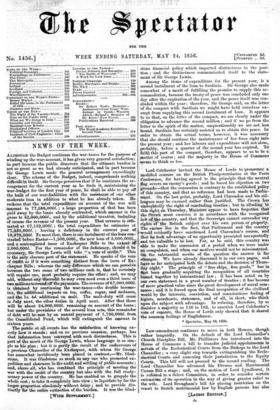Lord Colchester invited the House of Lords to pronounce a
Modified Censure on the British Plenipotentiaries at the Paris Conference, for having agreed to the principle that the neutral Slag covers an enemy's goods ; and he based his objection on two . grounds-4hat the concession is contrary to the established polioy of this 'country, and that no reference had been made. to Parlia-'. =ant. On the last point, probably, Lord Clarendon and his cOl- leagues may be excused rather than justified.. The Crown has undonbtedl$ the right of ooncluding treaties ; but in alluding this right an Thursday, Ministers appear to have forgotten that - the Crown must exercise it in accordance with the recognized of, the country, and that the Sovereign cannot surrender any rights of the British shbject over his own person or property. The excuse lies in the fact, that Parliament and the country Would evidently have sanctioned Lord Clarendon's course, and that he took, advantage of an' opportunity presented unexpectedly and too valuable to be lost. For, as he said, this country was able to make the concession at a period when we were under no compulsion, and when our motives would not be misconstrued. On the substantial merits of the question the answer is far' stronger. We have already discussed it in our own pages, and have so far anticipated both the debate and the decision ofThurs- chiy night.• The principle, of " free ships, free goods," has-in fact been gradually acquiring the recognition of all countries : bound together by international law ; it has been acted on by ' our own statesmen in a great number of treaties ; it has' become of more practical value since the great development of naval Com- merce ; and it is forced upon the final recognition of the civilized -world by the interests, conviction, and conscientious feeling of legists, merchants, statesmen, and of all, in short, who think upon the subject with advantage. In refusing, therefore, by so
decisive a majority as 156 to 102, to sanction Lord Colchester's vote of censure, the House of Lords only showed that it shared the common feelings of Englishmen.
* Spectator, May 10, 1856.


































